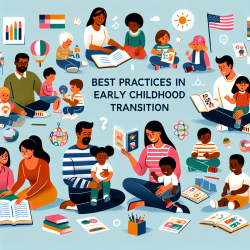Introduction
In the field of speech-language pathology and child development, understanding the impact of Adverse Childhood Experiences (ACEs) is crucial. Recent research, specifically the study titled "Evaluation of an Embedded Health Psychologist Intervention for Obstetric Patients With Adverse Childhood Experiences," highlights the importance of integrating mental health support within prenatal care. This approach not only supports the mother but also lays a foundation for better outcomes for children.
The Research
The study conducted at Kaiser Permanente Northern California evaluated the effectiveness of embedding health psychologists within prenatal care for patients with high ACEs and low resilience. The findings are compelling: patients with 3 or more ACEs were significantly more likely to receive referrals and participate in interventions when supported by an embedded health psychologist. This model of care, focusing on early intervention and resilience-building, aligns with the Andersen model of health services utilization, which emphasizes the importance of accessible and timely care.
Implications for Practitioners
For practitioners working with children and families, these findings underscore the importance of considering both ACE and resilience scores when planning interventions. Here are some actionable steps practitioners can take:
- Screening: Implement routine ACEs and resilience screening in prenatal and pediatric care settings to identify at-risk families early.
- Embedded Support: Advocate for the integration of mental health professionals within prenatal and pediatric care to provide timely and tailored interventions.
- Education: Educate families about the impact of ACEs and the importance of resilience, offering resources and strategies to build resilience in children.
Encouraging Further Research
While this study provides valuable insights, further research is needed to explore the long-term outcomes of embedded health psychologist interventions on child development. Practitioners are encouraged to engage in research and data collection to continue improving care models and outcomes for children with ACEs.
Conclusion
The integration of embedded health psychologists within prenatal care settings offers a promising approach to mitigating the effects of ACEs. By focusing on resilience and providing timely mental health support, practitioners can improve outcomes for both mothers and their children. This model not only aligns with data-driven practices but also emphasizes the importance of holistic care.
To read the original research paper, please follow this link: Evaluation of an Embedded Health Psychologist Intervention for Obstetric Patients With Adverse Childhood Experiences.










